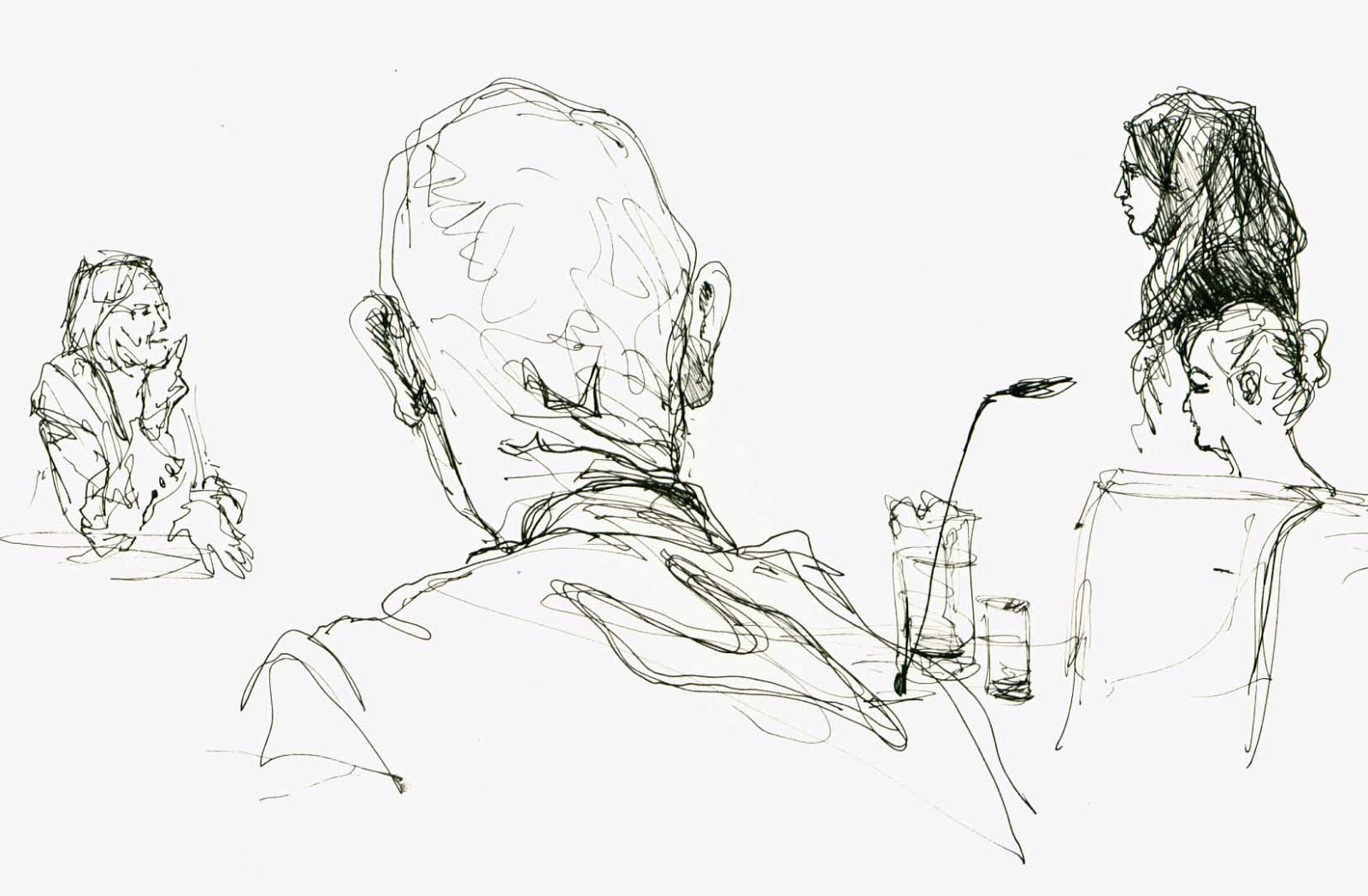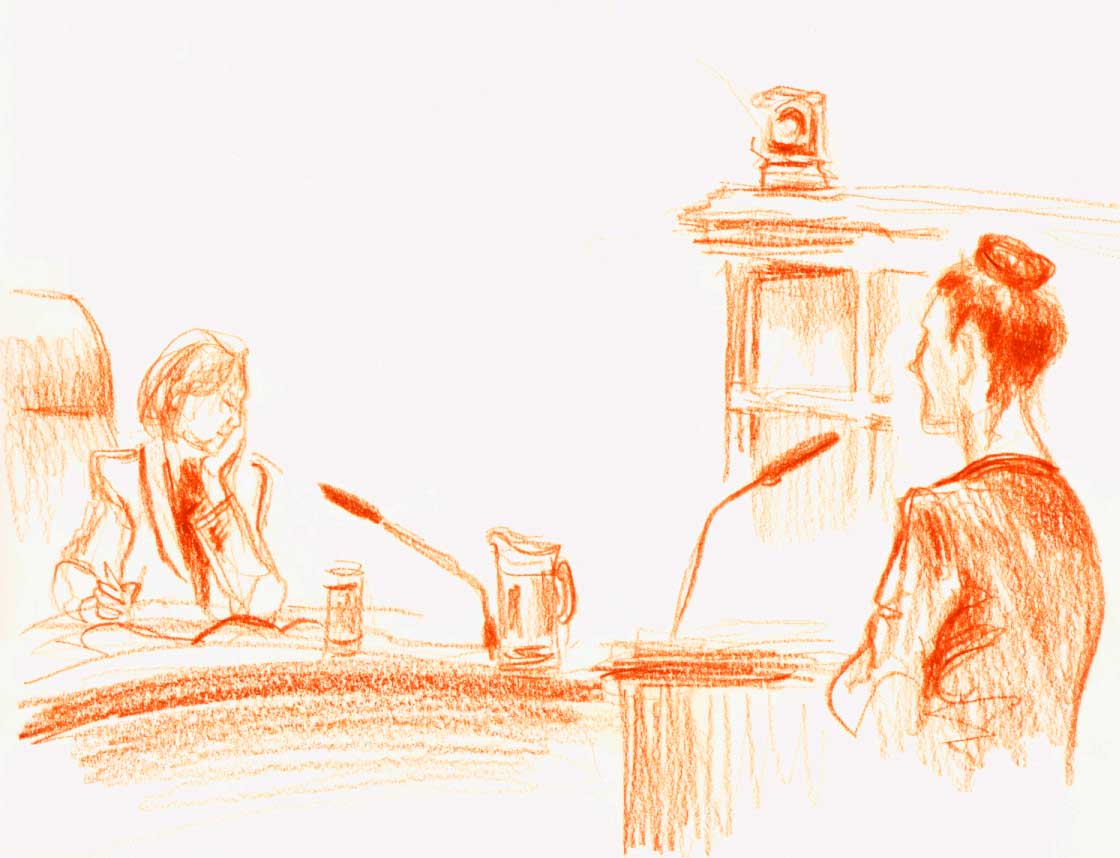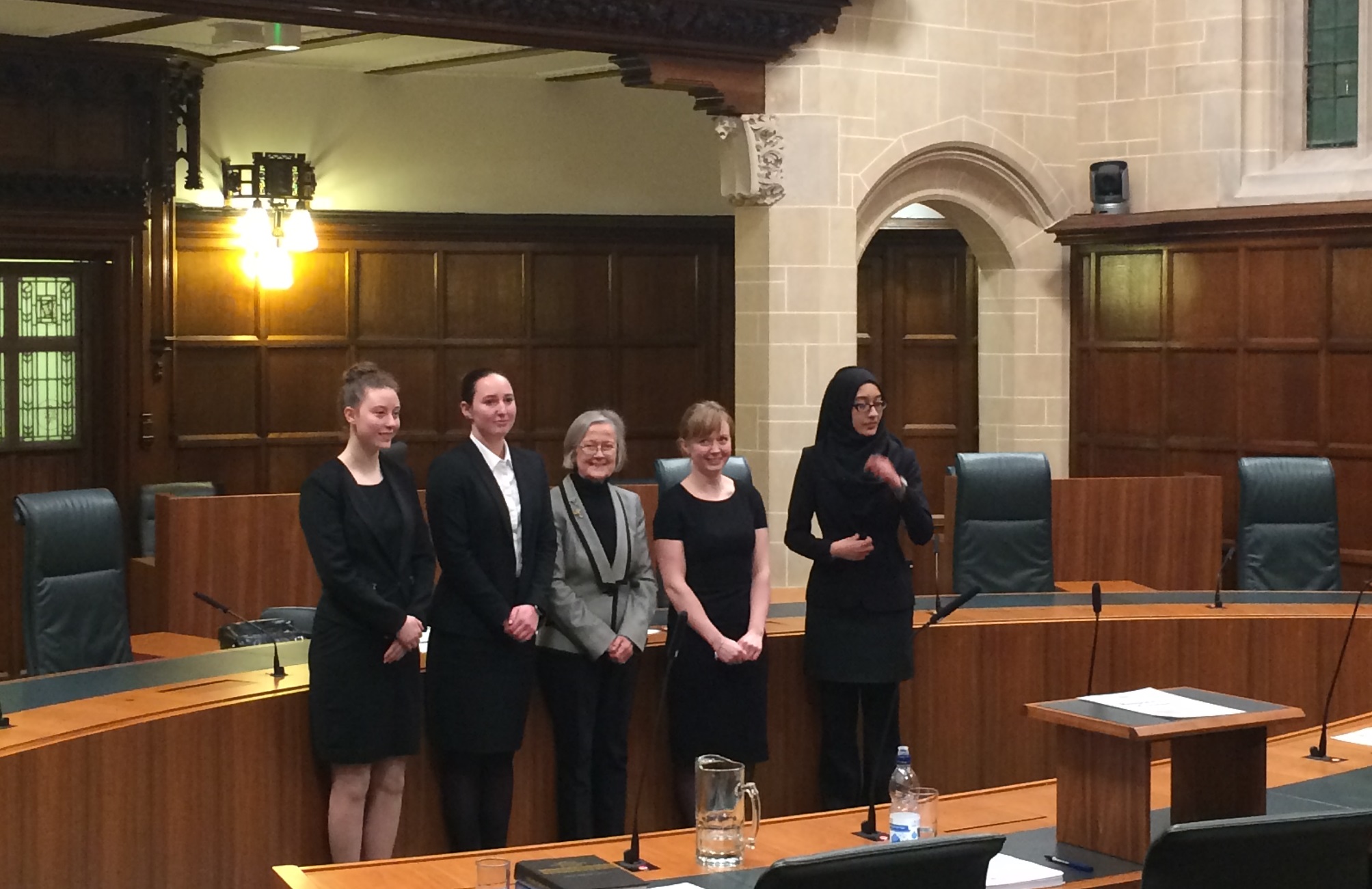ICLR Open University Law Society Mooting Competition 2017
The Grand Final of the ICLR Open University Law Society Mooting Competition 2017 was held in the main courtroom at the UK Supreme Court, before Baroness Hale of Richmond DPSC. Paul Magrath was there. Drawings by Isobel Williams. Fotherington v Perfect Wedding Co Ltd and another The problem for this third and final round of… Continue reading about ICLR Open University Law Society Mooting Competition 2017
The Grand Final of the ICLR Open University Law Society Mooting Competition 2017 was held in the main courtroom at the UK Supreme Court, before Baroness Hale of Richmond DPSC. Paul Magrath was there. Drawings by Isobel Williams.
Fotherington v Perfect Wedding Co Ltd and another
The problem for this third and final round of the competition run by the student run law society of the Open University was set by OU law tutor and ICLR law reporter Jessica Giles. It concerns a same-sex couple, Frederick and Armand, who wish to get married and the problems they encounter after making a contract with the defendant wedding organisers for the catering and photography.
It transpires that the wedding meal they have ordered (including, apparently, melon and Parma ham) will only be supplied by the defendants using Halal meat, to which the happy-to-be couple object on conscientious grounds. And the particular snapper they have insisted upon engaging, one Ralph Razzle, is a devout (not to say rather priggish) Christian who will only photograph a wedding between heterosexuals who are marrying for the first time or, if in a second marriage, are not guilty of adultery in their first.
The case therefore involves claims for damages for discrimination, direct or indirect, under the Equality Act 2010 and for breach of contract and specific performance of that part of the contract under which Ralph Razzle would be the person supplying photography services. The defendants deny direct discrimination, seek to justify indirect discrimination on grounds of religious freedom, and deny breach of contract having offered a suitable substitute photographer.
Having lost in the county court and Court of Appeal, the claimant is now appealing to the Supreme Court. The teams are:
Abigail Scott and Farhana Begum for the claimant / appellant.
Ilana Hirschberg and Ann-Marie O’Neil for the defendants / respondents.
Undaunted by the fact that they are appearing before the Deputy President of the Supreme Court, who stops them with sometimes awkward and sometimes deceptively basic questions, they persevere valiantly. Lady Hale is strict but fair, and reveals her engaging niceness only after the case is over and her judgment delivered.
Much of the argument revolves around cases, such as Preddy v Bull [2013] UKSC 73; [2013] 1 WLR 3741 with which, for obvious reasons (being one of the Justices who decided it) Lady Hale is deeply familiar. If a case is cited, such as Schnorbus v Land Hessen (Case C-79/99) [2000] ECR I-10997, she expects the person citing it to know its facts as well as the principle for which it is relied on.
When asked, by junior counsel for the respondents, whether in view of her earlier comments she still wishes to hear argument on direct discrimination — whether, in other words, counsel is “pushing at an open door” (as the saying goes), Lady Hale observes with a smile:
You prepared both aspects of the case. You’d better have a go at it – until I have a go at you.”
Giving judgment, on the photography issue Lady Hale points out that it is not the practice of the courts to grant specific performance of contracts for personal services, and she doesn’t consider discrimination makes any difference. Moreover, given the offer of an alternative photographer of equal competence, any damages in contract, calculated to put the claimant in the position he would have been in had the contract been performed as agreed, must be pretty low. There might be some damages for injury to feeling. But there has been no assessment.
As to discrimination, this can only be direct, based on a protected characteristic, namely that of sexual orientation, and the appellant wins on that point. Indirect discrimination does not arise.
On the catering issue, setting aside the absurdity of Halal ham, it is difficult to imply a term that the meat supplied under a catering contract will be non-Halal. So there is no breach of contract. As to discrimination, this can only be indirect, since the condition of Halal meat is applied to all customers, not just those of the protected characteristic (assuming that’s what it is) of conscientious objection. Can it be justified? As suppliers, the defendants are entitled to decide what goods to supply, in this case Halal meat, provided they supply the same to all their customers. So that claim fails.
As to the teams’ performance, here Lady Hale herself seeks a variation of contract.
ALL the contestants have been terrific, she says. They have presented their parts of the case clearly and “stood up to me”. They have all done very well.
Unable to decide between the two teams, Lady Hale decides to split the prize between the two contestants, one from each team, whom she assesses as having done just that bit better in terms of dealing with her (entirely foreseeable) “nasty questions” and getting back into their stride more quickly.
Lady Hale concludes with some tips for the mooters (and future advocates).
- First, take care not to be too quiet. The first requirement of any advocate is to be heard!
- Second, pick up on any messages you receive from the bench. If a point isn’t going anywhere, drop it and move on.
- Third, it is a good technique to summarise what a case says, when citing it, rather than reading out chunks of it verbatim (though many far more experienced counsel still do that).
- Finally, when citing statutes, you really do need to know and explain precisely what the words mean.
So the winners are Miss Scott, first counsel for the appellant, and Miss O’Neil, second counsel for the respondent.
Each receives, along with our congratulations, a copy of the UK Supreme Court Yearbook Vol 7 (2016) and the ICLR Law Reports 1865 – 2015 Anniversary Edition.
This report of the moot was written by Paul Magrath, Head of Product Development and Online Content at ICLR, who also edited the ICLR book donated as a prize.
The drawings were by Isobel Williams, who has done a lot of drawings at the Supreme Court, including coverage of the recent “article 50 case” (R (Miller) v Secretary of State for Exiting the European Union [2017] UKSC 5) which you can find on her blog, Drawing from an uncomfortable position. She has kindly permitted us to reproduce two drawings from her own blog post on this moot.


